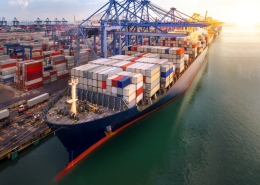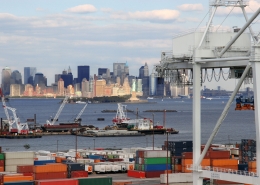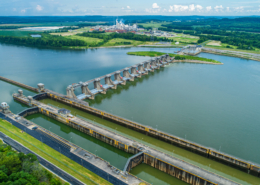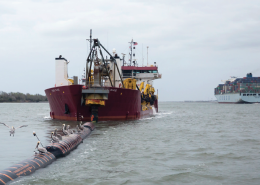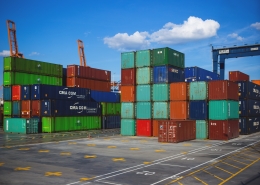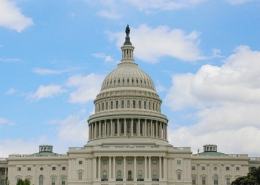This article is a part of our series From Lighthouses to Electric Chargers: A Presidential Series on Transportation Innovations
This is the ninth article in our series about transportation and U.S. presidents. Appropriately, given the length of William Henry Harrison’s term in office, it will also be our shortest.
As a congressman from Ohio, Harrison supported federal funding for roads and canals as a way to spur growth in the west as well as integrate and strengthen the American economy. John Quincy Adams, president during the late 1820s, was a strong advocate for this economic program known as the “American System.” However, the two presidents who succeeded Adams (Andrew Jackson and Martin Van Buren), had serious reservations about it.
In 1836, Harrison ran on the newly formed Whig Party ticket for president against Van Buren. The Whigs supported undertaking more infrastructure projects and high tariffs to help pay for them. Harrison lost that year, but he was a stronger candidate in 1840 with many Americans blaming Van Buren for the ongoing economic depression.
Before 1840, presidential candidates had mostly avoided making public appearances because actively campaigning for oneself was not seen as dignified. Harrison ran what has been referred to as the first modern presidential campaign, featuring advertising, slogans, campaigns songs, and organized rallies. His slogan, “Tippecanoe and Tyler Too”, referred to Harrison’s success leading the 1811 Battle of Tippecanoe and his vice-presidential running mate, President Tyler.
The lyrics of his campaign song began with the words:
What’s the cause of this commotion, motion, motion
Our country through?
It is the ball a-rolling on
For Tippecanoe and Tyler too.
Harrison’s campaign held rallies, some of them attracting tens of thousands of attendees. One of the reasons Harrison’s tactics worked was because by 1840, nearly all white men could vote. In the previous two decades, states had extended voting to many who had been previously excluded such as factory workers, laborers, and Jews.
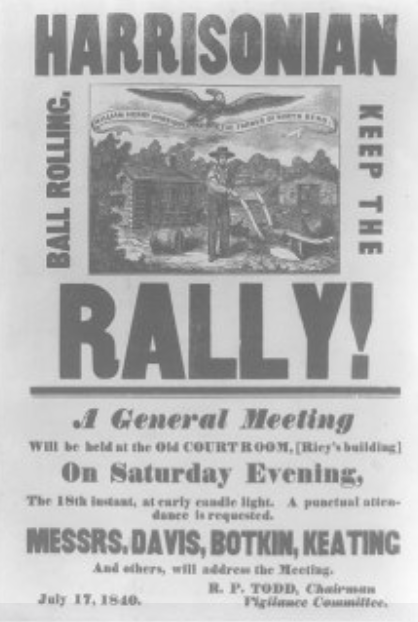
Campaign rally poster
During the campaign, the 67-year old Harrison had been incessantly mocked as being too old for the job. At his March 4, 1841 inauguration, he demonstrated his physical stamina by delivering an inaugural address that was nearly two-hours long. Despite the cold wind, he chose not to wear an overcoat, hat, or gloves for the ceremony.
As president, Harrison enjoyed daily walks; the original form of human transportation. The painting below shows Pennsylvania Avenue and 7th Street at the time, just a short stroll from the White House.
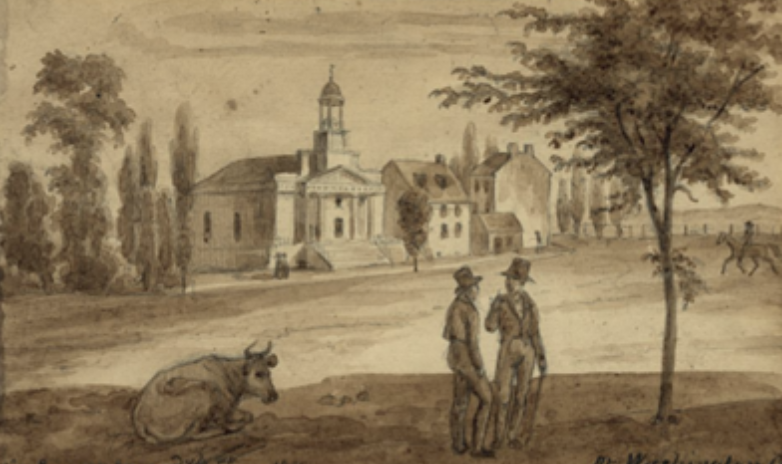
Photo source: Library of Congress
President Harrison had unlimited freedom when he walked to the local market. Today, before an American president goes for a stroll — Secret Service agents arrive early, scout out the area, and identify secure locations in case of an event or attack. They bring bomb-sniffing dogs, notify hospitals, set up security perimeters with metal detectors, close off streets, line the walking route with counter snipers, and prepare bullet-proof limousines and helicopters for a potential evacuation.
But, Harrison often walked by himself to the market. After getting caught in a sudden storm on March 24, he did not bother to change his wet clothes upon returning to the White House. The nation’s history might have been different, if the president’s mother or wife were around, urging him to take better care of his health. Alas, his mother had died nearly five decades earlier, and his wife decided to wait until the weather was warmer before she traveled from her Ohio home to Washington, D.C.
Four days after the sudden storm, a team of doctors began treating Harrison for pneumonia. On April 3rd, only 31 days after his inauguration, Harrison uttered his final words. No president before or since has served a shorter time in office.
Information and people traveled slowly in 1841. The news of Harrison’s death did not reach Fayette, Missouri for 14 days and the 2,000 residents of Los Angeles would not learn of Harrison’s fate until a shipper clip arrived in July.





